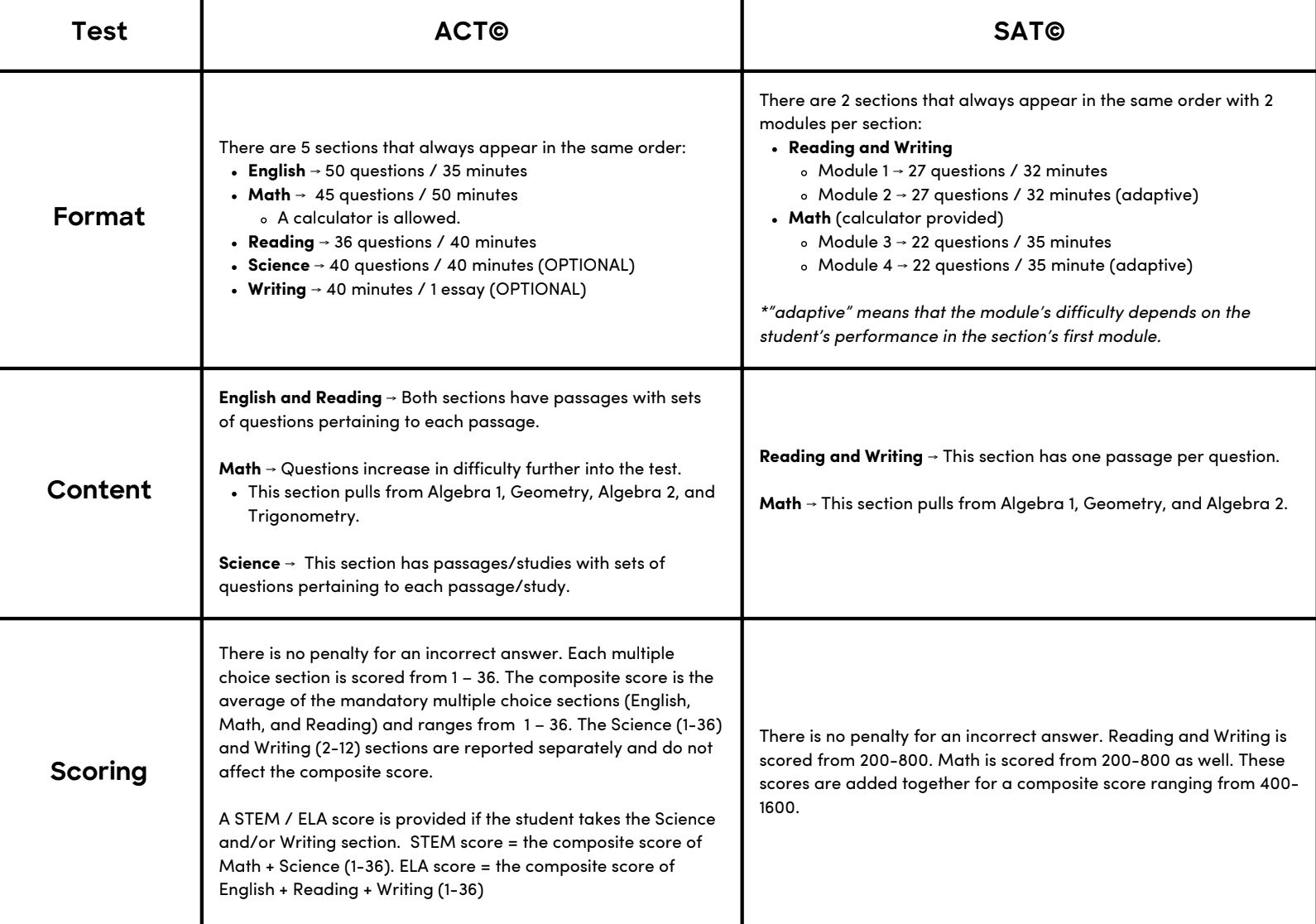As testing season hits full swing, don’t miss this month’s blog all about test prep! Elizabeth Wuenscher, a core member of our development team, shares her expert insight on the ACT and SAT to help you determine which exam is the best fit for you. Plus, stick around for a fun quiz at the end!
Among the many questions high school students have to ask themselves (“Which classes should I take? What are the best ways to study? Did I remember to complete that Algebra II homework assignment? Will I make the soccer team?”), one major question creeps in as college becomes a looming reality: Do I take the ACT or the SAT?
Well, as part of Cram Crew’s Development team, I’m here to ease any Test Prep stress and break down the similarities and differences between the two tests so that students can choose the test that best fits their strengths.
Let’s walk through the five components to consider when deciding which test to take: format, medium, timing, skill, and college plans.
First, here’s a basic breakdown of how the tests are structured. (Don’t feel like you need to memorize all of this information now! In your first session with a Test Prep Consultant, you’ll be going over this information in detail.)


Overall, the ACT tests comprehension and application of specific skills at a faster pace, while the SAT tests critical thinking in multi-step problems—so, think about whether you’re stronger at thinking on your feet, or if you prefer to take some time and break down problems step by step.
The major difference between the ACT and the SAT is that while the ACT is offered both digitally and on paper, the SAT is only offered digitally. So, if you prefer taking tests the old-fashioned way (on paper), then you can rule out the SAT!
*Both the ACT and the SAT provide accommodations for students who cannot take tests digitally. If you have testing accommodations, please visit the ACT and/or SAT site(s) for more details about the specific accommodations offered.
Even though the ACT is faster-paced per question, it’s still a longer test overall compared to the SAT. So, if taking a three-hour-long test seems unfeasible for you, the ACT might not be the best option. But, if the ACT seems like the better option for you—even if the length is a little daunting—there are many strategies to practice that can help with timing and stamina, which you’ll learn with your Test Prep Consultants.
It can be tempting to think that the ACT is for the “verbal people,” and that the SAT is for the “math people,” but the truth is that there are a lot more nuances between the two tests regarding which is more suited for a certain type of skill set. Yes, considering how the ACT Science section is now optional, the ACT is weighted more towards Verbal (with two Verbal sections and one Math section), and the SAT is more geared towards math (with its shorter Verbal passages and implementation of the Desmos calculator). However, some more verbally inclined students may find the SAT verbal questions easier to parse through, or more mathematical students may prefer the faster-paced math on the ACT.
ACT = Verbal and SAT = Math can help you initially choose which test to try, but don’t feel like just because English is your favorite class it means that the ACT is the best fit for you. Sometimes, it’s not just about your strengths, but also your weaknesses. For example, you might be better at English and therefore more inclined to take the ACT, but since you struggle with math, that might make the SAT and its Desmos calculator more enticing. There’s no “one size fits all” with these tests—it’s all about what best fits you.
There’s more to figuring out which test is best for you than just the tests themselves—for example, if you’re going into a writing-heavy major for college, you may want to take the ACT, which offers an optional Essay section. Or, if you’re going into a STEM field, you may also want to take the ACT, since the test offers an optional Science section with a separate STEM score alongside the Composite score, which can be good to show universities. The SAT could also be a good option with its implementation of the Desmos calculator, which you may have to become familiar with using in STEM programs and beyond.
All in all, there are a lot of factors to consider, but we’re here to guide you through that process. To get started with the Test Prep process, decide on which test to start with and sign up to take the Baseline Diagnostic Test (BLD) by contacting your local Cram Crew office. We have a Baseline Diagnostic Test for both the ACT and SAT, but don’t worry—just because you choose to take the ACT BLD doesn’t mean you’re stuck with the ACT forever (or vice versa). Regardless of which test you choose, with Cram Crew’s Test Prep, you’ll be provided with Cram Manuals for both the ACT and the SAT, along with The Official ACT Prep Guide© and the SAT Study Guide©.
We hope this breakdown makes testing (and deciding on which test to take) a little less daunting! To help you jumpstart your decision, take our ACT vs SAT Quiz: Which Test is Best for You?



Stay informed with academic support resources, college
application updates, key deadlines, and expert educational tips when you subscribe to our monthly newsletter. Let us keep you confidently
in the educational loop.